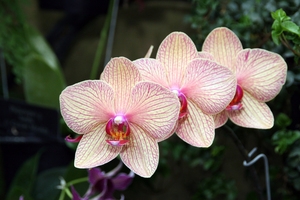 Phal. violacea
photo by
Lourens Grobler
Phal. violacea
photo by
Lourens Grobler
Member Plants
27 plants cultivated by members of ORCHIDS.ORG. See All Member PlantsUpcoming Global Events

24th World Orchid Conference, Germany
There are currently no photos of plants of
Phalaenopsis violacea
for sale by members of ORCHIDS.ORG.
Below are other recent plants for sale:
Log in to Add a Comment

Author is Ken Slump, posted about 5 years ago
A 12-Step Plan for Becoming a Successful Orchid Grower
IF YOU ARE NEW TO THE ORCHID hobby and perhaps feel you are not enjoying the success with your plants that you had hoped for, read throug...
Read More

Author is Roy Tokunaga, posted over 5 years ago
We take water for granted. It falls out of the sky. It flows from the faucet. Oahu city water is considered good for growing Orchids. We use it without thought or concern.
If you study orch...
Read More
Do you have a plant for sale or trade
which you cannot ship or do not want to bother shippping?
No problem.
Click here to make a local-only offer.
It's a free service to our members.
Orchid Species: Phalaenopsis violacea
(This name is currently accepted by Kew.)
Phalaenopsis violacea is an orchid species identified by H.Witte in 1861.
Genus
Phalaenopsis (Phal.)
Grex
violacea
(name currently accepted by Kew)
(name currently accepted by Kew)
Parents
Species
Author
H.Witte
Year
1861
ORIGIN: Found in the Malaya peninsula and the Indonesian island of Sumatra at elevations around 150 meters.
DESCRIPTION: Small to medium sized, hot growing, pendulous epiphyte with a very short stem carrying 3 to 4, elliptical, obtuse, undulate gradually narrowing below into the basally clasping leaves that varies from P bellina by being smaller leafed and with smaller flowers, as well as being easier to cross breed but the results are not as good as with P bellina which is a reluctant breeder from Borneo. P violaceae has extremely fragrant flowers occurring in the spring that are borne one by one in succession on a pendant, stout, jointed, fractiflex, 4 to 5 [10 to 12.5 cm] long inflorescence with a flattened, zigzag rachis with several [2 to 7], successive flowers with 2 to 3 open at any one time.
FLOWER SIZE: 1.4 inches [3.5 cm] -- information provided by Jay Pfahl, author of the Internet Orchid Species Encyclopedia (IOSPE).
DESCRIPTION: Small to medium sized, hot growing, pendulous epiphyte with a very short stem carrying 3 to 4, elliptical, obtuse, undulate gradually narrowing below into the basally clasping leaves that varies from P bellina by being smaller leafed and with smaller flowers, as well as being easier to cross breed but the results are not as good as with P bellina which is a reluctant breeder from Borneo. P violaceae has extremely fragrant flowers occurring in the spring that are borne one by one in succession on a pendant, stout, jointed, fractiflex, 4 to 5 [10 to 12.5 cm] long inflorescence with a flattened, zigzag rachis with several [2 to 7], successive flowers with 2 to 3 open at any one time.
FLOWER SIZE: 1.4 inches [3.5 cm] -- information provided by Jay Pfahl, author of the Internet Orchid Species Encyclopedia (IOSPE).
Other Names
| Genus Name | Genus | Grex Name | Year | Author | |
|---|---|---|---|---|---|
| Add+ | Polychilos | Polychilos | violacea | 1982 | (H.Witte) Shim |
| Add+ | Stauropsis | Sp | violacea | 1862 | (H.Witte) Rchb.f. |
| Add+ | Stauritis | Stauritis | violacea | 1862 | (H.Witte) Rchb.f. |
Most awarded/recent cultivars:
Phal. violacea f. alba 'Akka'
(6 awards from
2010
to
2011)
Phal. violacea f. alba 'Multi'
(5 awards from
2011
to
2018)
Phal. violacea h.v. sumatrana 'Strub'
(4 awards from
2013
to
2018)
Phal. violacea 'Peggy Ozmer'
(4 awards from
1961
to
1968)
Phal. violacea 'Freddy'
(3 awards from
1971
to
2002)
Phal. violacea 'Borneo Moon'
(3 awards from
1966
to
1967)
Phal. violacea f. alba 'Kiel'
(2 awards in
2018)
Phal. violacea f. alba 'Strub'
(2 awards from
2011
to
2016)
Phal. violacea f. alba 'Hocheis'
(2 awards in
2016)
Phal. violacea f. alba 'Anja'
(2 awards from
2010
to
2013)
Phal. violacea 'Gerda'
(2 awards from
2011
to
2013)
Phal. violacea f. alba 'Gayle Nance'
(2 awards in
2010)
Phal. violacea f. alba 'Tejas Ghost'
(2 awards in
2007)
Phal. violacea f. alba 'SP White X'mas'
(2 awards in
2007)
Phal. violacea var. alba 'Marilyn'
(2 awards in
1991)
Phal. violacea 'Blue Blood'
(2 awards from
1987
to
1988)
Phal. violacea var. alba 'Botany Bay'
(2 awards in
1988)
Phal. violacea 'Maria Vasquez'
(2 awards from
1983
to
1988)
Phal. violacea 'Shamrock'
(2 awards in
1984)
Phal. violacea 'Harford's Orange'
(2 awards in
1982)
Featured Site Articles
Read Latest Articles
Beginners Start Here

Water: The Most Important Nutrient
New Topics
- Kjell Meershoek started topic Re-inventing an orchidarium.. your thoughts in category Curiosity
- David George asked question Odom's Fascination - an unusual orchid in category General Discussion
- Carol Holdren asked question Grow Tent in the Garage in category General Discussion
- David George asked question rlc Caotan Beauty found at Home Depot in category Cattleya Alliance
- Kristin Dorris asked question Odontocidium Orchid fungus? in category General Discussion
New Comments
- Carol Holdren commented on topic "rlc Caotan Beauty found at Home Depot " by David George
- Carol Holdren commented on topic "Odom's Fascination - an unusual orchid" by David George
- Dr. Florian Wolf commented on topic "Wild. Lisa Devos" by Maria Fernandez
- Michael Valcarcel commented on member plant Rlc. Chief Takanaka by Walceli Muniz Valverde
- Michael Valcarcel commented on member plant Rlc. Montana Spirit by Michael Valcarcel
- Michael Valcarcel commented on member plant Ctt. Blazing Sun by Michael Valcarcel
- Michael Valcarcel commented on member plant Bc. Spotted Clown by Michael Valcarcel
- Maria Skrypnyk commented on member plant Yamadara Redland Sunset by Maria Skrypnyk
- André Pessina commented on topic "Odontocidium Orchid fungus?" by Kristin Dorris
- Linda Hartman commented on topic "Image of a plant please" by Leshya Perkins
- Paul Reavis commented on orchid Milt. Kismet
- Christiaan Viljoen commented on member plant Psh. fragrans by Christiaan Viljoen
- Christiaan Viljoen commented on member plant Z. maculatum by Christiaan Viljoen
- Christiaan Viljoen commented on member plant C. Gaskell-Pumila 'Azure Star' by Christiaan Viljoen
- Robert H. Findlay commented on member plant Rlc. Joy Sokabe var. Volcano Queen by Sally K
- James Lunsford commented on member plant Lc. Sagarik Wax 'African Beauty AMO/AOS x Blc. Cherry Suisse'Kauai' HCC/AOS var. Cattlyea 'Hybrid ' by James Lunsford
- John Varigos commented on orchid Bulb. schwarzii
- Linda Hartman commented on topic "Issue with Blc. Ben O'Neil "Jubilee" by Glenda Ratliff
- Henry Shaw commented on member plant Ons. Catatante 'Los Roble' by Henry Shaw
- Mary Lane commented on member plant Den. Tianmu Canary by Terre Moore


